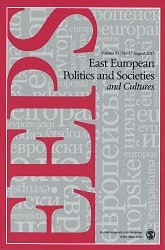The Politics of Public Spending in Post-Communist Countries
The Politics of Public Spending in Post-Communist Countries
Author(s): Romana Careja, Patrick EmmeneggerSubject(s): National Economy, Governance, Economic history, Political history, Political economy, Post-Communist Transformation, Public Finances
Published by: SAGE Publications Ltd
Keywords: public expenditure; social expenditure; education expenditure; post-communist countries; political determinants of public spending;
Summary/Abstract: A growing body of literature documents that under the economic and social pressures accompanying the post-communist transformations, governments in Central and Eastern European countries have been forced to change their spending habits. However, because most of these findings are based only on case studies or comparisons of a very small number of countries, it is difficult to observe to what extent the post-communist countries’ development patterns share commonalities or develop in unique ways. This article explores in a quantitative comparative framework the effects of government composition, globalization, political institutions, and socioeconomic factors on total public, public social, and public education expenditures in twelve nation states. The authors find that the party composition of government has the most robust effect, in that left incumbency is positively correlated with total public and social expenditures. This result indicates that in this sense, post-communist countries are similar to Western democratic ones. The authors find only mixed results regarding the effects of globalization on public spending. This might suggest that globalization does not have a direct effect on the spending policies of these countries, but rather is mediated by domestic contexts.
Journal: East European Politics and Societies
- Issue Year: 23/2009
- Issue No: 02
- Page Range: 165-184
- Page Count: 20
- Language: English
- Content File-PDF

